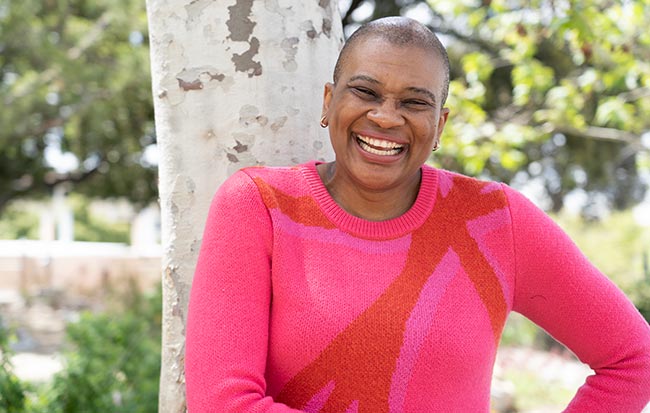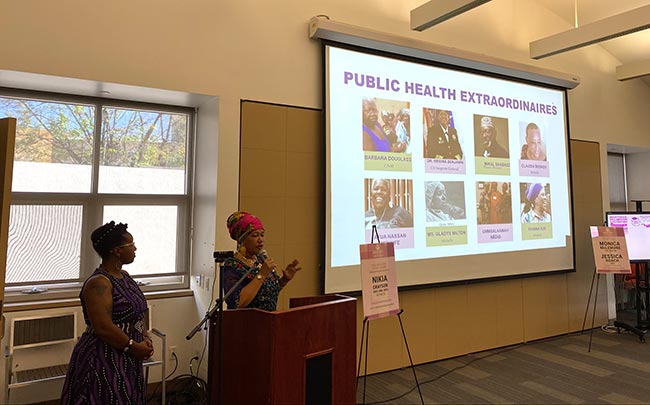‘It’s a beautiful morning to change the world’: Black midwifery conference inspires

Pitzer Professor of Sociology Alicia Bonaparte was one of the organizers of the Midwifery Is Public Health conference at Pitzer College. Courier photo/Andrew Alonzo
By Lisa Butterworth | special to the Courier
“It’s a beautiful morning to change the world,” said Kimberly Durdin last Saturday morning to the hundred or so attendees of the inaugural Midwifery Is Public Health conference at Pitzer College.
Durdin, a cofounder of the birthing center Kindred Space L.A., was one of the featured experts midwives, doulas, public health practitioners, scholars, advocates, and students traveled from all over the country to hear speak. The two-day conference focused specifically on Black midwifery — its history, cultural significance, and ongoing importance to the well-being of communities.
In addition to panels and presentations that explored midwifery integration, public health research and funding, and reproductive justice, attendees were also treated to an a capella performance of traditional midwife songs, a documentary about Black birthing customs, and a dance party. It was “a dream come true” for Pitzer Professor of Sociology Alicia Bonaparte, who also called it a “labor of love — and I’m intentionally using those terms,” she said.
Bonaparte organized the conference with the help of Keisha Goode, an assistant professor of sociology at New York’s SUNY College at Old Westbury, and Monica McLemore, interim director of University of Washington’s Center for Anti-Racism and a professor in its Child, Family, and Population Health Nursing Department along with a steering committee of midwives, clinicians, public health scholars, and reproductive justice activists. “We knew we wanted a space for people to be honored, for people to truly see the expertise of midwives, and to also showcase how current public health leaders are using midwives when developing interventions to help reduce experiences of racism within clinical environments,” Bonaparte said. “We wanted people to know that [birth centers] are true public health interventions.”

Jamarah Amani (left) midwife and executive director of the Southern Birth Justice Network and founder of the National Black Midwives Alliance, and Mama Shafia Monroe, midwife and executive director and founder of Shafia Monroe Consulting. Photo/by Alicia Bonaparte
Bonaparte’s interest in Black midwifery began when she first learned about granny midwives — Black women in the South who carried on the tradition brought to the U.S. by enslaved African midwives. Midwifery is most associated with childbirth and delivery. But as Bonaparte explained, it is so much more — “an art and a science,” she said, borrowing a phrase from conference speaker Nikia Grayson, chief clinical officer of Choices Center for Reproductive Health in Memphis. “These were women who were healers, they were functioning as abortionists, they were not only people who caught babies for both Black and white populations, but they were integral members of communities and there was a large amount of trust that people had in them,” Bonaparte said. “It led me to understand more about this history and the ways in which these women were eventually persecuted and also prosecuted almost to the point of elimination.”
On the History of Black Midwifery panel, Dr. Michelle Drew, a tenth-generation midwife and executive director of Delaware’s Ubuntu Black Family Wellness Collective, highlighted this persecution. The pathologization of pregnancy; the rise of obstetrics, the realm of wealthy white male doctors; and the associated racist, sexist, and classist campaigns and regulations against granny midwives forced the midwife population to drop from 100,000 — 90 percent of whom were Black — in the late 1800s to just a few thousand in the 1950s. Harmful repercussions still reverberate through Black communities, with infant and maternal health bearing the brunt of institutionalized medicine’s racial disparity — including the fact that Black women are three times more likely to die from a pregnancy-related causes than white women, regardless of socio-economic status.
But rather than fixate on that data, Bonaparte wants to shift the conversation to the Black midwives who are carrying on the legacy of their ancestors, providing expert care to their communities in the wake of institutionalized medicine’s failure to do so. “I’m more so interested in, which is also the purpose of the conference, highlighting — there are people doing amazing work, and that work is lending itself to happy birthing babies and happy birthing pregnant people.” The goal is to raise awareness about those people, increase resources for the work being done, and inspire others to join the movement.
Though support for and interest in midwifery have grown, of the 15,000 midwives in the U.S. today, less than 1,000 are Black. In addition to delivering babies they offer perinatal support, sexual reproductive healthcare, and family planning. Some are considered spiritualists, healers, and community leaders. But perhaps most importantly, “they serve as a safe space,” Bonaparte said, a crucial component given the racist history of obstetrics and gynecology in the U.S.
Midwifery Is Public Health was its own kind of safe space. “It’s a very unique conference in the sense that it’s put on by leaders in public health that are interconnected with the historical context and appreciation of what Black midwifery specifically has contributed to this country,” said attendee Asmara Gebre, a midwife at University of California at San Francisco School of Medicine. “A lot of us work in spaces that aren’t structured in this way, so there tends to be a lot of pushback with our ideas, with the values of our work, and it can be isolating and harmful. So, it’s reassuring to know that we’re not onlys. We actually are a collective group of folks moving this work forward, and our work is purposeful and important and there is space for us to hold community and fill our cups.”
The conference was inspiring for local practitioners too, like Claremont-based doula Sarah Michal Hamid. “I want to be able to one day be a midwife in Claremont and be able to support the community that I grew up in,” she said. “There’s this myth that it’s just white middle class people that want midwifery care in Claremont and that’s not true. People of all ethnic, racial, and religious communities choose midwifery care in Claremont and it’s our job as a city to foster that.”
And though Durdin’s opening remarks on Saturday might have seemed lofty, conference attendees and organizers alike felt the sparks of true change. “We have had some really heavy and radical discussions about ways to push our legislators and policymakers forward, in ways to support our communities and ways to support midwives and nurses in setting up their own businesses and being able to practice independently,” said Nikki Lanshaw, a public health scholar who manages a fellowship program at UCSF School of Nursing.
“One of the things that I loved is that students were there and they were talking about, ‘If I want to do these things, if I want to engage in this work, how do I do that?’ And we were having very constructive conversations,” Bonaparte said. “I’ve been teaching for almost 20 years now. When I first started I was like, ‘If I can change the world, it’s great.’ But what you realize is if you touch just one person, that is what leads to change.”







0 Comments